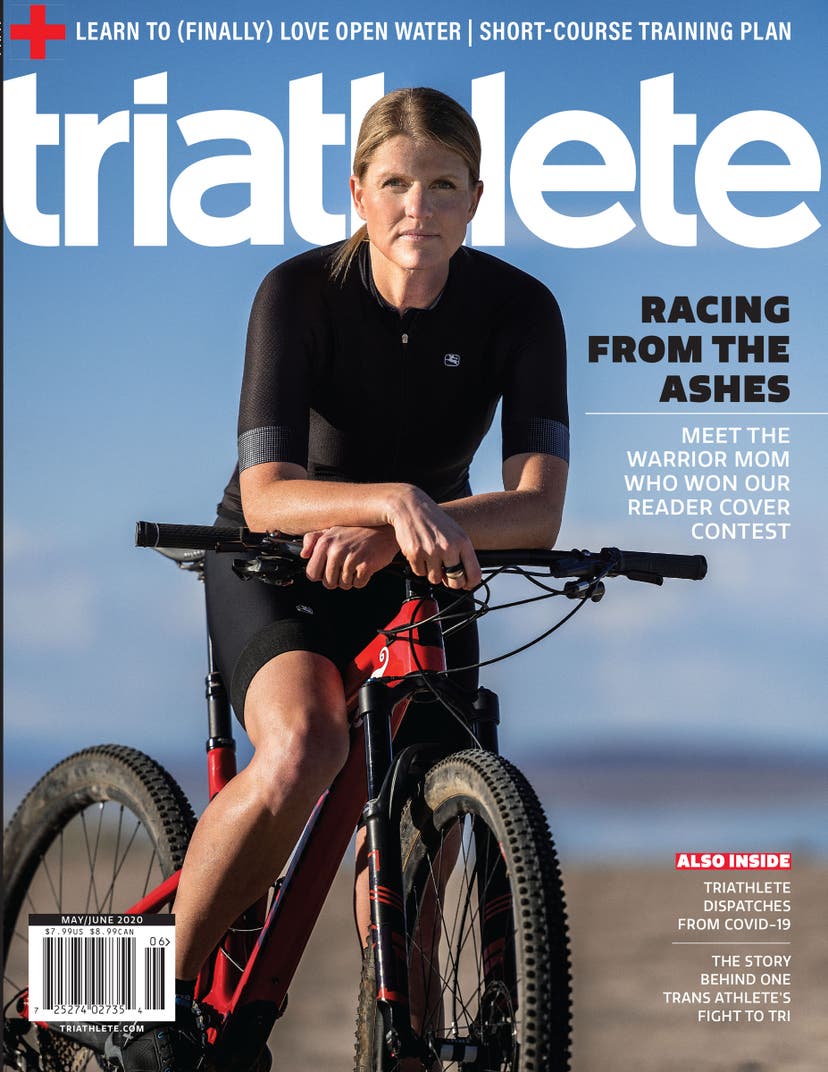Racing From the Ashes: Meet Cover Contest Winner Anita Coyle
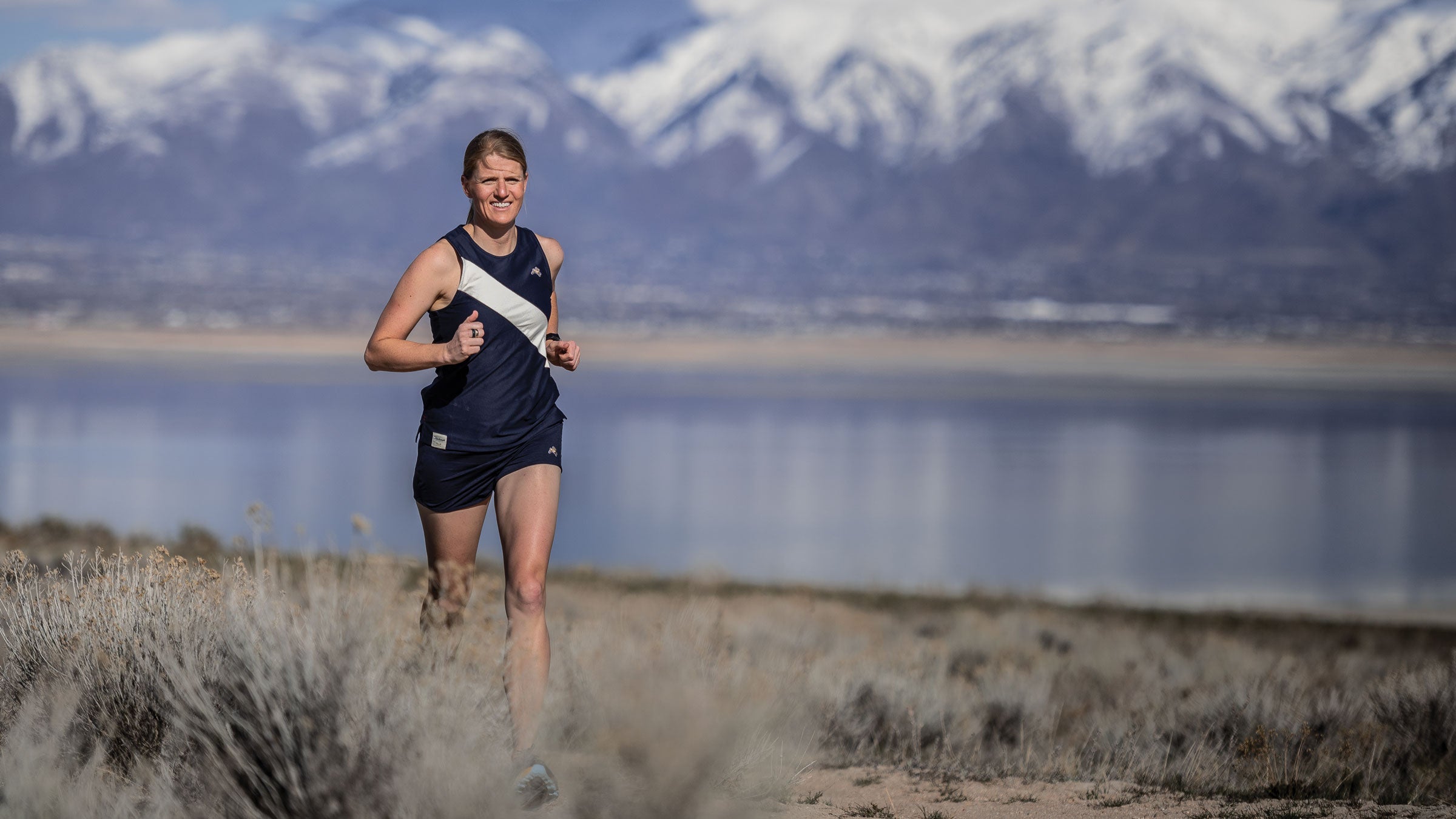
Photo: Nils Nilsen
If you think you’ve had a bad week, just wait until you hear about the start of Anita Coyle’s 2019.
It was Jan. 2 when she headed into the hospital for what was supposed to be a routine surgery. She had a nodule on her thyroid that had been diagnosed as non-cancerous but still needed to be removed. (And, yes, this story is going where you think it is, but not yet.)
She had decided to do the surgery early in the year, so she could get back to training and try to qualify for XTERRA Worlds in Maui in the fall. She had qualified the year before, but she and her husband Jason decided things were too busy with their four kids. Their plan was to try qualify again in 2019 and head to Hawaii in October.
Jan. 2 was a Wednesday, and Jason skipped his usual Wednesday morning swim to go with her to the hospital. That meant Thursday night he headed to the pool to swim the evening Masters practice instead.
At 9:30 p.m., police officers showed up at Anita’s door.
“At first I thought, ‘Oh man, what did he do? He must have tripped and fallen and needed stitches,’” she said. Of course, now she realizes police don’t come to your house for that.
She drove to the hospital and the doctor came out to tell her something she never expected: Jason died tonight. “It was just out of the blue,” she said.
Here is a thing she would like people to know: Sudden cardiac arrest can happen to even healthy athletes. It’s not a heart attack. It’s something experts have increasingly been paying attention to in endurance athletes, because for many of them sudden cardiac arrest is the first real sign of an underlying heart issue. There can be some symptoms, often noticed in retrospect, that are indicative of a heart defect and of a predisposition to cardiac arrest, but they can be a bit vague, especially for athletes who otherwise seem healthy: lightheadedness at times, fatigue, shortness of breath, performance drops, swelling in the limbs, occasional nausea. Jason had been a marathon swimmer. He had swum 10K on New Year’s Day.
In retrospect, Jason had gotten dizzy a few times over the months before. It turned out he had a heart defect they didn’t know about—an enlarged heart and an arrhythmia.
That night, he’d started swimming the warm-up and stopped because he felt like he was going to throw up. He got out and collapsed in the locker room.
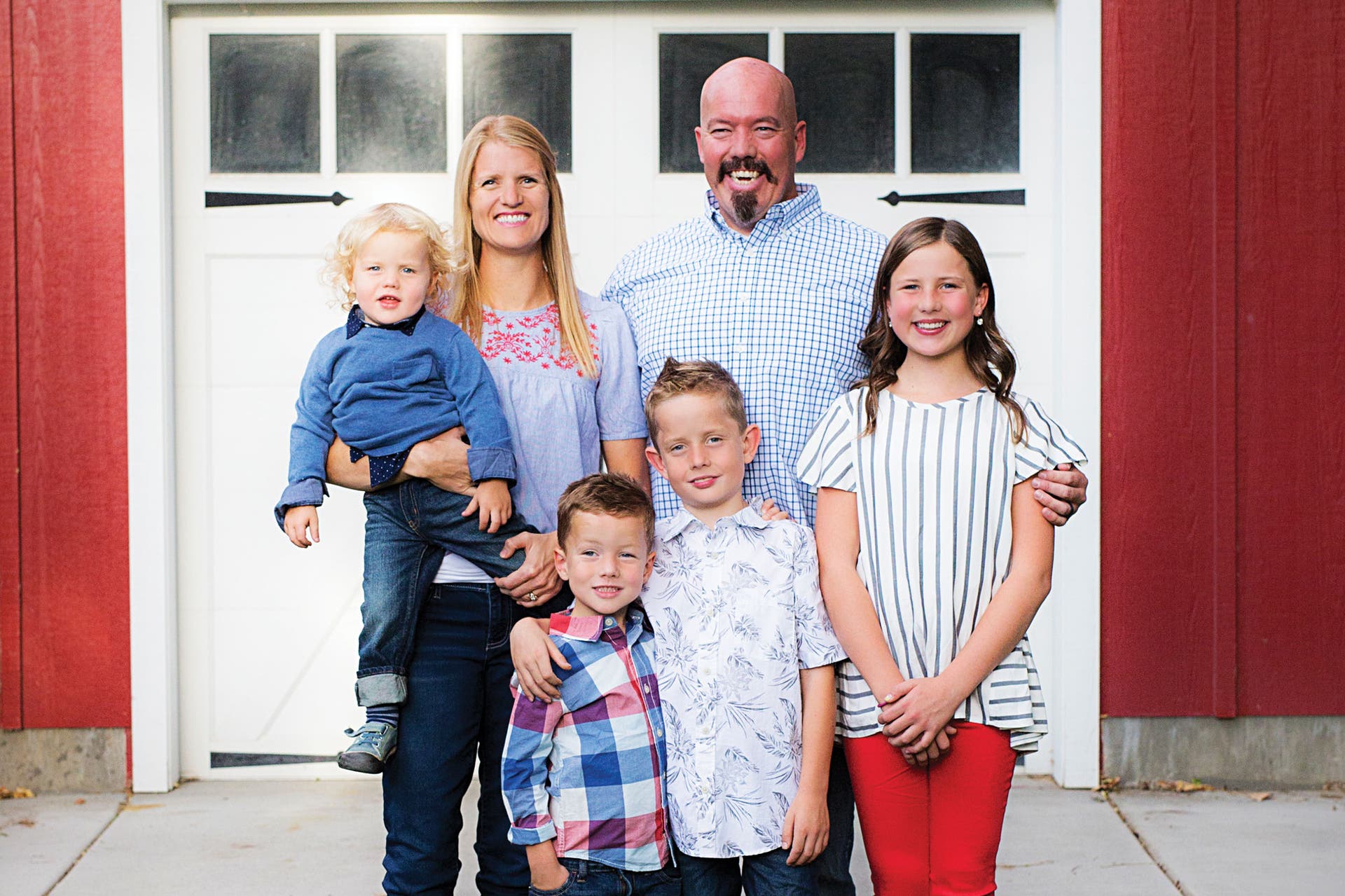
“It’s just nuts is what it is,” said Anita. “Life just flipped on its head.”
And Then The Ashes Caught Fire
Anita was still trying to figure out how to continue, how to raise four kids—now ages 3, 6, 9, and 13—in the suburbs of Salt Lake City, Utah, all by herself, when her doctor called.
That nodule they had removed turned out to be cancerous. Hurthle cell carcinoma, or oxyphilic cell carcinoma, is a rare and aggressive form of thyroid cancer that typically requires surgery—a grim diagnosis. Anita wanted to be conservative with treatment, but it was still going to take a lot of doctors’ appointments and a lot of recovery.
“It was a rough two weeks, a rough year, a rough 15 months,” she said.
But while lots of people who have terrible things happen to them simply have to focus on doing their best to survive and getting through their own lives, Anita didn’t see it that way. “You just want to crawl into your grief cave and hide, but she doesn’t,” said Scott Christley, who nominated Anita for our Reader Cover Contest. Instead, Anita did something different.
“What’s so unique is how she’s approached it. Anita’s chosen to use this moment of heartbreak in a way to try to help other people,” said Lindsay Barenz, a lifelong friend of Jason’s and now a friend of Anita’s too.
Instead, Anita decided to be open and vulnerable and real about what it was like to find a way to keep moving forward—ugly and messy details included.
And so she started an Instagram account that she called “Racing from the Ashes.” Her tagline: “First my world burned down, and then the ashes caught fire.” Now she had to find way to rise out of those ashes, and help other people do it too.
“I’m trying to be open and honest about what it’s like,” she said. “People only share their best moments on social media. And it’s not real. I’m not trying to make it look effortless; I’m trying to make it look real. I think we need more real. So we don’t feel like we are the only ones struggling.” Originally, she thought her Instagram account would just be about her training and triathlon, but grief and parenting and figuring it all out kept creeping in. And people kept thanking her for her honesty, for her telling them they weren’t alone.
“People are constantly expressing gratitude,” said Barenz, for Anita’s honesty. Barenz is amazed sometimes about her friend’s ability to be so vulnerable and open, but somehow Anita does it. She does it on her popular Instagram; she does it alongside a friend who also lost her husband, on their podcast Widow We Do Now, and she does it every day with humor and grace.
“She can still find ways to make jokes and laugh,” said Christley.
“I wouldn’t be surprised if in a year she announces she has a book deal,” said Barenz. She’s meant that much to so many.
But that wasn’t what Anita set out to do. At first, she had just set out to find a way to keep moving forward, to keep her kids fed, to stay healthy and sane. At first, after that terrible visit from the police and then that call from the doctor, It was just all a fog. How do you go on?
For the Love Of It
Jason and Anita met “when I was 12 minutes out of high school,” she joked, at a church activity. They grew up blocks from each other and, as part of the Church of Latter Day Saints, they’d both been involved in their church community for a long time. But they didn’t meet until after high school.
Anita joked she immediately thought he was the coolest thing ever. “I was throwing myself at him, but he didn’t know I was interested,” she said. By the age of 19, they were married—though that seems crazy to her now.
They quickly became an active couple. “When we got married, one of the first presents he got me was a mountain bike,” she said. They’d go to Moab and mountain bike for date nights. Even if she wasn’t a great mountain biker, it was fun.
Jason loved cycling. And he was a marathon swimmer, doing 10K and 5K races—but he hated running. “He was our fearless leader,” said Christley, who became friends with the couple in 2010. Jason had convinced him to buy a cheap bike and get out there. Then Jason rallied a few more local guys and got them into biking, convinced them to do a 420-mile relay from Salt Lake City to St. George. The group did it every year for nine years. This year they did it again, without their leader, and renamed their team Jason’s Salty Saints.
For Anita, the process of becoming a triathlete may have started gradually, but then it happened all at once. She played volleyball and softball growing up, but hated running. It was during school for physical therapy that a bunch of friends wanted to do a sprint triathlon. She agreed, and then “they all bailed, and I was the only one who ended up doing it,” she said.
It was hard! But she did another, and a few years later another. “At some point, I stopped just participating and started trying to win,” she said.
It was really when she found the trails and mountain biking that she fell in love. In 2015, she did her first small off-road triathlon and decided this was for her, this was her thing—even if it was scary and hard and a huge line of people formed behind her as she slowly navigated a descent on her bike. She just loved it.
A few weeks after Jason died, she started running again, casually, just for her sanity. And she thought, “You’re going to need this even more.” It was the only time she felt a little bit of happiness amid all the chaos, and she started to think again about her and Jason’s plan for her to race the XTERRA World Championships in Maui that fall. Then she kept thinking about it.
“The idea crept into the back of my mind: ‘Maybe you could still train, still try to qualify for Maui?’” she said.
She had qualified in 2018, and the two of them were going to go, but things were busy with the kids and it was expensive. “What’s going to happen?” Jason had said, “We can always go next year.” And now she just couldn’t stop thinking: You don’t know what’s going to happen, you never know. You have to do things when you can.
A Network of Help
But how? How was she going to train and qualify for world championships? While raising four kids as a single mom and working part-time as a physical therapist, trying to make ends meet? All while going through cancer treatment?
“It worked with a lot of help,” she said. “I had an amazing support network.” Every day, Anita looked at her work schedule and her kids’ schedule and figured out the next day. There was a group of women from their church who made a calendar and made themselves available. If Anita needed someone to come over and babysit or just needed to go for a run, everyone chipped in.
Sometimes, though, she just had to cram a run or ride in where she could.
Sometimes things would get crazy. Her youngest son would cover his face with waterproof lipstick or pour dishwasher soap all over the carpet. Do you know how hard it is to get dishwasher soap out of carpet? Christley jokes 90 out of 100 times there were things he’d never even heard or seen with his own kids. The boys could be rambunctious, said Barenz. “It’s an exponential ramping up of insanity.”
After the funeral, Barenz, who had grown up with Jason, wanted to do something to help Anita, but she didn’t know what. She knew exercise was going to be important in the coming months and biking and running were important to Anita. She knew it would be hard with four kids and work, but she didn’t know how she could lighten that burden. “I’m not spiritual, but I felt like Jason told me what to do,” said Barenz. He told her to help Anita so that her friend could continue to do this thing the two of them had loved.
So Barenz showed up at their house every Saturday to watch the kids while Anita rode or ran. And she drove her to the Beaver Creek XTERRA race in Colorado.
At that race, Anita came fourth, just missing qualifying for Maui. It was disappointing, but it certainly wasn’t the end. Not for Anita. She rallied again for the Pan-American XTERRA Championship in her backyard in Ogden, Utah. Her friends and family came out and cheered for her. And she did it. She qualified for the world championships in Maui.
“It didn’t obviously take away any of the pain or the challenge,” said Barenz, but it helped. “It helped to have something external to focus on.”
“There were times when that was all I had,” said Anita. The goal kept her moving. “At times I wanted to quit life, then I would run up a hill and say to myself, ‘Not everybody can do this. You are strong!’ And I would keep going.”
And so she kept going, all the way to Hawaii.
One Last Thing
It wouldn’t be Anita’s story, though, if it wrapped up there with a neat tidy bow; if it didn’t involve a bruised kidney and chaos, but also a finish line too. That wouldn’t be real.
A few days before the race in Hawaii, she was practicing her open-water swimming and got slammed hard by a wave. Her back kept killing her and she was peeing blood, but she told herself her pee was probably just a weird color from the one little beet in the salad at dinner. “You’re an idiot,” she joked about herself after, because that doesn’t really make a lot of sense. But she wanted to keep believing the best. So she just kept going through the race, loving every second of it and stopping to help other people along the way. She’d come this far just to get here, to participate. She finished and then she went to the ER.
At the banquet before the race, she was sitting in the audience with her two oldest kids, her sister, and Barenz when the announcers on stage called her name. She’d won the XTERRA Warrior Award. They hadn’t told her it was coming. “What if I wouldn’t have showed up?” she wondered. It was a shock.
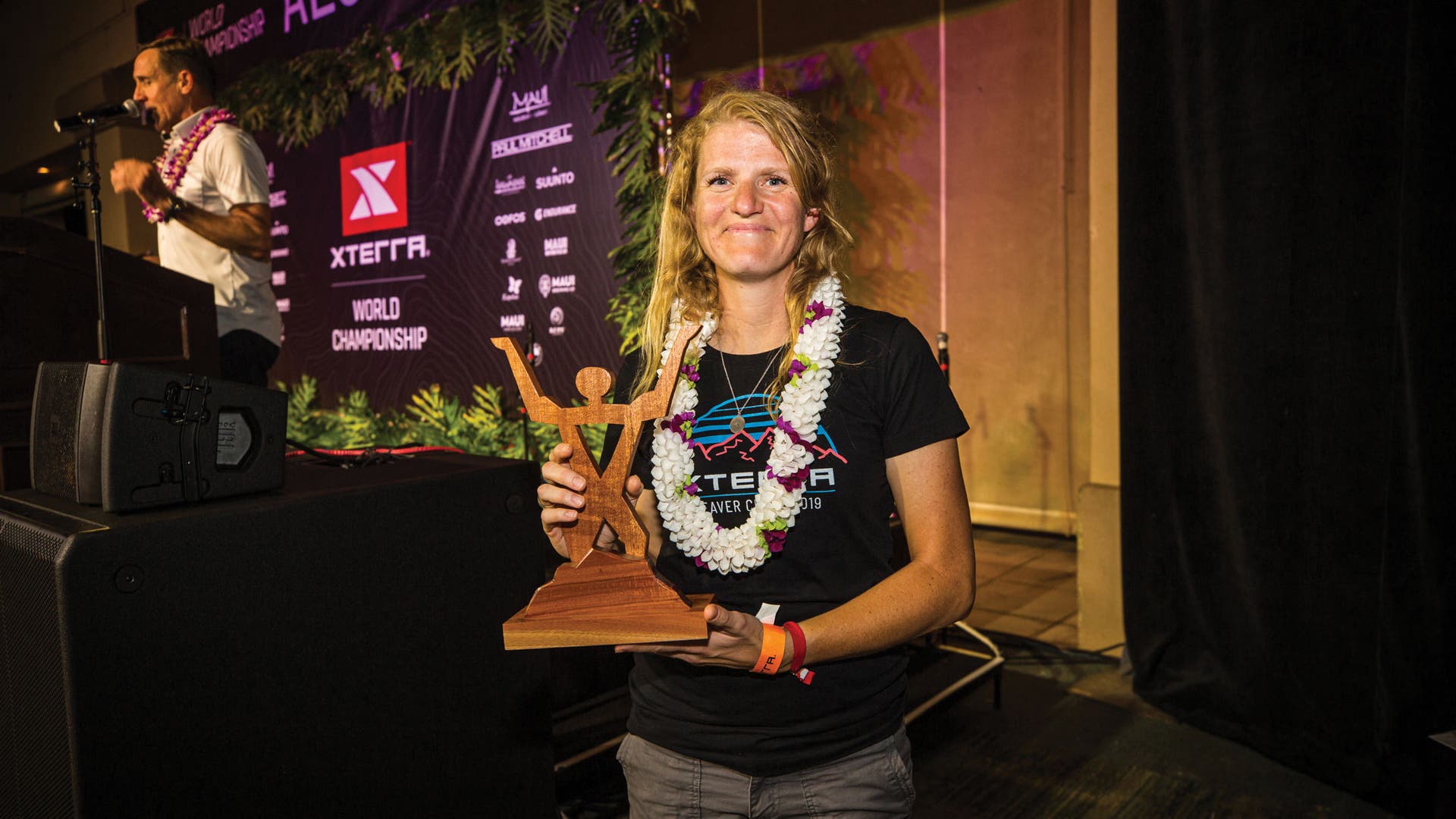
Now, she said, “a little piece” of her wonders if she should try to qualify again, go back and really race it as fast as she can, with an unbruised kidney this time. She doesn’t know yet if she’ll try. Things are still crazy. It’s still hard to raise four kids. They had an earthquake recently and everyone got stuck at home because of the COVID-19 pandemic. There’s no escaping real life.
On her Instagram, she jokes that she’s living in a research experiment with the four “subjects”—that is, her kids—and the things they test her with. She refers to them jokingly by numbers: #4 cut a hole in his shirt one day and flooded the bathroom another, #3 refused to do his schoolwork during this chaotic homeschooling situation. Life went on anyway.
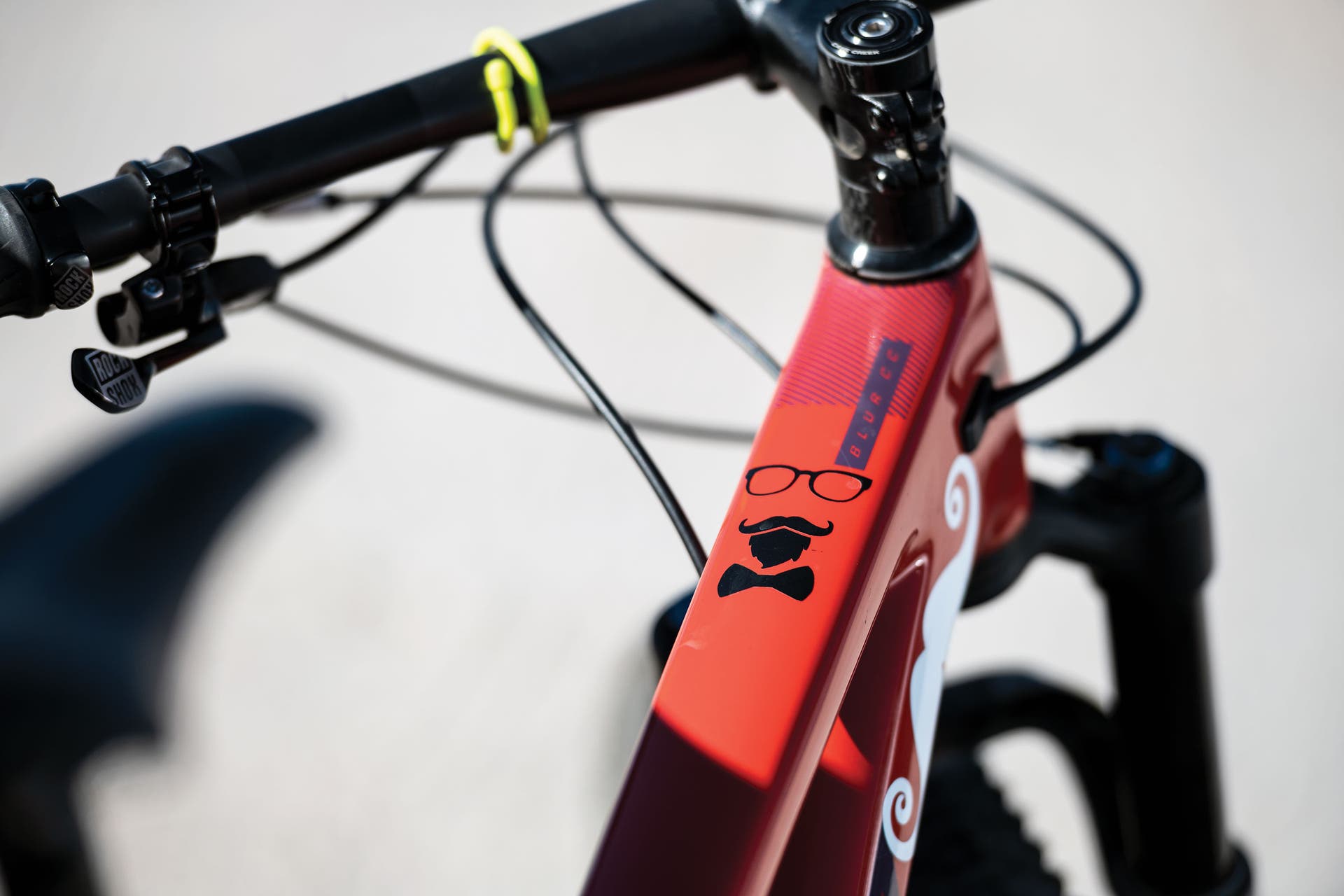
Maybe once the youngest kids are in school, she’ll work full-time, and then maybe it’ll be a little easier financially. But it’s not like life suddenly gets easier one day. It’s not like you suddenly stop being sad. So she still takes it day-by-day, week-by-week. Some weeks and days are better than others. She found the text of a children’s book Jason had written, and so she had copies of Mr. Coyle’s Mustache printed up and made. She put fun mustache stickers on her mountain bike in honor of Jason. (He was famous for his mustache.)
And she keeps going. She wrote on her Instagram after a terrible storm recently that she could either fight the storm and break:
“Or I can take a lesson from the trees. I can hold my ground while I also give into the wind…I might lose some branches, it might not be pretty and it certainly won’t be pleasant. But when I am through that storm, my roots, my trunk, my soul will be stronger and better prepared for the next storm. I will have experienced this storm, and I will know I can make it through the next one also.”
The same day she found out she’d won our reader cover contest, she also heard from her doctor: She was in remission and didn’t need to come back in for at least a year.
It was a good week. One storm had passed and she was still standing.
